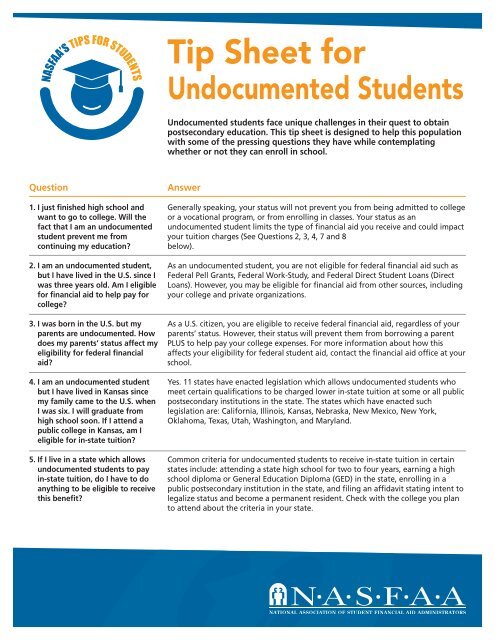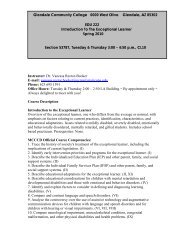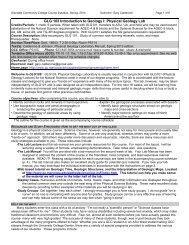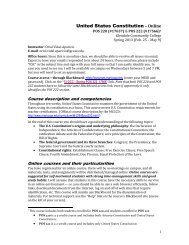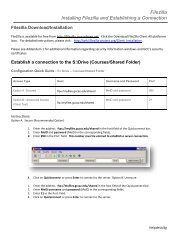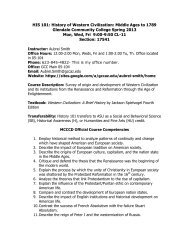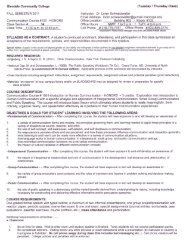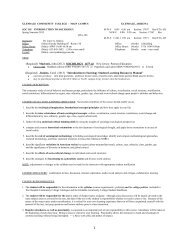For Undocumented Students - Blackhawk Technical College
For Undocumented Students - Blackhawk Technical College
For Undocumented Students - Blackhawk Technical College
Create successful ePaper yourself
Turn your PDF publications into a flip-book with our unique Google optimized e-Paper software.
NASFAA’S TIPS FOR STUDENTSTip Sheet for<strong>Undocumented</strong> <strong>Students</strong><strong>Undocumented</strong> students face unique challenges in their quest to obtainpostsecondary education. This tip sheet is designed to help this populationwith some of the pressing questions they have while contemplatingwhether or not they can enroll in school.Question1. I just finished high school andwant to go to college. Will thefact that I am an undocumentedstudent prevent me fromcontinuing my education?2. I am an undocumented student,but I have lived in the U.S. since Iwas three years old. Am I eligiblefor financial aid to help pay forcollege?3. I was born in the U.S. but myparents are undocumented. Howdoes my parents’ status affect myeligibility for federal financialaid?4. I am an undocumented studentbut I have lived in Kansas sincemy family came to the U.S. whenI was six. I will graduate fromhigh school soon. If I attend apublic college in Kansas, am Ieligible for in-state tuition?5. If I live in a state which allowsundocumented students to payin-state tuition, do I have to doanything to be eligible to receivethis benefit?AnswerGenerally speaking, your status will not prevent you from being admitted to collegeor a vocational program, or from enrolling in classes. Your status as anundocumented student limits the type of financial aid you receive and could impactyour tuition charges (See Questions 2, 3, 4, 7 and 8below).As an undocumented student, you are not eligible for federal financial aid such asFederal Pell Grants, Federal Work-Study, and Federal Direct Student Loans (DirectLoans). However, you may be eligible for financial aid from other sources, includingyour college and private organizations.As a U.S. citizen, you are eligible to receive federal financial aid, regardless of yourparents’ status. However, their status will prevent them from borrowing a parentPLUS to help pay your college expenses. <strong>For</strong> more information about how thisaffects your eligibility for federal student aid, contact the financial aid office at yourschool.Yes. 11 states have enacted legislation which allows undocumented students whomeet certain qualifications to be charged lower in-state tuition at some or all publicpostsecondary institutions in the state. The states which have enacted suchlegislation are: California, Illinois, Kansas, Nebraska, New Mexico, New York,Oklahoma, Texas, Utah, Washington, and Maryland.Common criteria for undocumented students to receive in-state tuition in certainstates include: attending a state high school for two to four years, earning a highschool diploma or General Education Diploma (GED) in the state, enrolling in apublic postsecondary institution in the state, and filing an affidavit stating intent tolegalize status and become a permanent resident. Check with the college you planto attend about the criteria in your state.
Question6. I know that a few states allowundocumented students to becharged lower in-state tuition.Are there any states which havelaws prohibiting undocumentedstudents from receiving in-statetuition?7. As an undocumented student,what type of financial aid isavailable from the college I planto attend?8. As an undocumented student, Iknow I am not eligible forfinancial aid from the federalgovernment. Where can I look tofind private scholarships?9. Can I use my scholarship moneyto pay expenses other thantuition?10. If I discuss my undocumentedstatus with a counselor in thefinancial aid office at my school,is he or she required to reportme to U.S. Citizenship andImmigration Services (USCIS)?AnswerYes. Four states—Arizona, Colorado, Georgia and Indiana—have enacted legislationwhich prohibits undocumented students from receiving in-state tuition at publicpostsecondary institutions in those states.The aid available to undocumented students from colleges and other postsecondaryschools varies widely among institutions. Aid could include institutionalscholarships, grants, loans, and work programs. Institutional scholarships oftencome with a merit component. To find out what is available at the college you planto attend, contact the financial aid office.Here are some websites you can use to research scholarships:Fast Web: www.fastweb.com;Mexican American Legal Defense and Education Fund: www.maldef.org;Get Ready for <strong>College</strong>: www.getreadyforcollege.org/gPg.cfm?pageID=1586;Latino <strong>College</strong> Dollars: www.latinocollegedollars.org;Scholarships for Hispanics: www.scholarshipsforhispanics.org; andGenesco Migrant Center: www.migrant.net.You can use financial aid to cover the following school expenses: tuition and fees,room and board, books and supplies, the cost of a computer, and personal expensesincluding transportation. You should check with the organization that awarded youa scholarship about any restrictions on its use.Financial aid counselors are not required by federal regulations to reportundocumented students who seek counseling or other services from the financialaid office.Developed in 2011 by NASFAA’sAccess, Diversity and Excellence Committee


